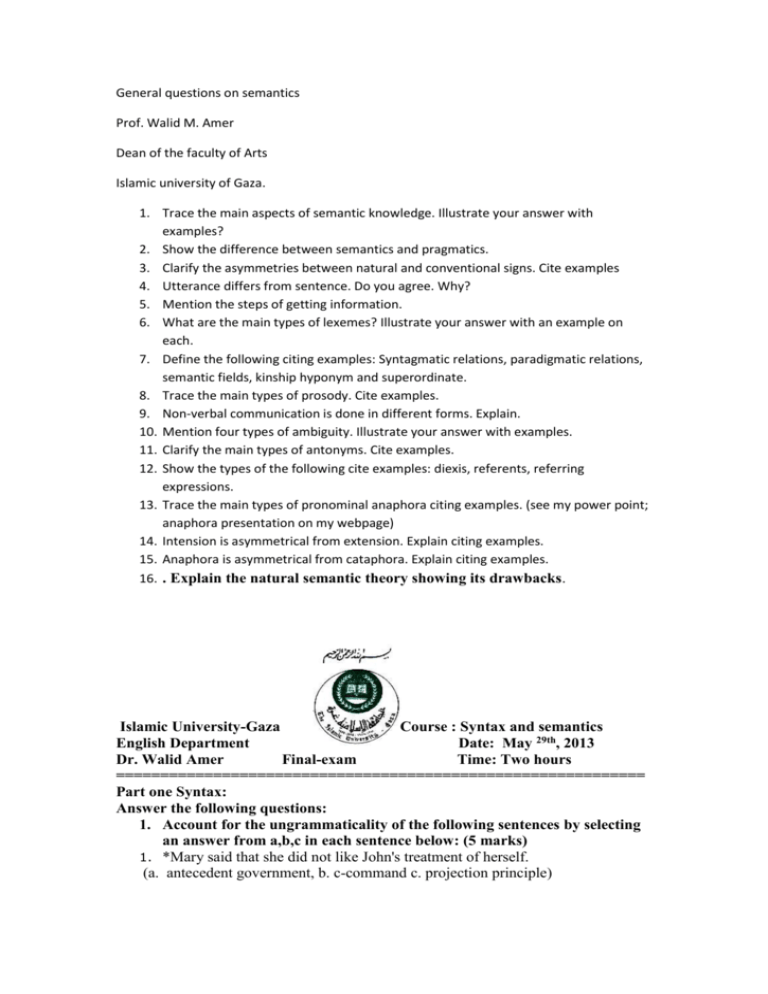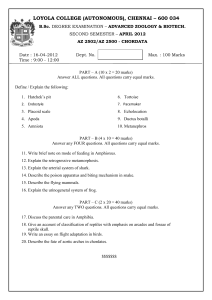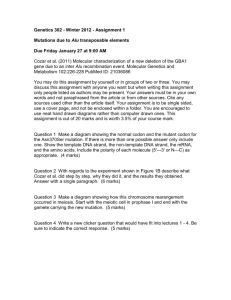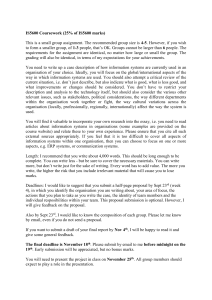General questions on semantics. 13/5/2015
advertisement

General questions on semantics Prof. Walid M. Amer Dean of the faculty of Arts Islamic university of Gaza. 1. Trace the main aspects of semantic knowledge. Illustrate your answer with examples? 2. Show the difference between semantics and pragmatics. 3. Clarify the asymmetries between natural and conventional signs. Cite examples 4. Utterance differs from sentence. Do you agree. Why? 5. Mention the steps of getting information. 6. What are the main types of lexemes? Illustrate your answer with an example on each. 7. Define the following citing examples: Syntagmatic relations, paradigmatic relations, semantic fields, kinship hyponym and superordinate. 8. Trace the main types of prosody. Cite examples. 9. Non-verbal communication is done in different forms. Explain. 10. Mention four types of ambiguity. Illustrate your answer with examples. 11. Clarify the main types of antonyms. Cite examples. 12. Show the types of the following cite examples: diexis, referents, referring expressions. 13. Trace the main types of pronominal anaphora citing examples. (see my power point; anaphora presentation on my webpage) 14. Intension is asymmetrical from extension. Explain citing examples. 15. Anaphora is asymmetrical from cataphora. Explain citing examples. 16. . Explain the natural semantic theory showing its drawbacks. Islamic University-Gaza Course : Syntax and semantics English Department Date: May 29th, 2013 Dr. Walid Amer Final-exam Time: Two hours ============================================================ Part one Syntax: Answer the following questions: 1. Account for the ungrammaticality of the following sentences by selecting an answer from a,b,c in each sentence below: (5 marks) 1. *Mary said that she did not like John's treatment of herself. (a. antecedent government, b. c-command c. projection principle) 2. * It appears Palestinian resistance will destroy the insolence of the Israel entity (a. theta criterion b. proper government, c. subjacency) 3. *Dr. Alqaradawy was fond nice scenes he had seen during his visit to Gaza. (a. case filter b adjacency principle c. empty category principle) 4. * Mary believes that John has scratched Mary. ( a. economy principle b principle c. of binding theory c. theta criterion) 5. * we believes that insists to defile Alaqsa mosque a. projection principle, principle A of binding c. proper government. 6. * What did Bill make the claim that he read ? ( a. case filter, b. theta criterion c. subjacency principle) 7. *the kids saw them. a. c.command, b. principle B of binding c. empty category principle. 8. * she does not know if to pass the exam. (a. Empty category principle b. head government c. PRO is governed) 9. * who did you think that t will arrive first. ( a. c-command b. that trace filter c. subjacency principle) 10. *Who did Bill tell when she had seen? (a. principle b of binding b. m.command c. island constraints) 2. Trace the scenarios of assigning case in English and Arabic citing examples. (10 marks) 3. Define four only of the following citing examples: (10 marks) a. That trace filter b. Extraction c. A-position d. Subjacency principle e. c. command Part two: Semantics. a. Answer the following questions: 1. Show the type of ambiguity in each of the following sentences: (5 marks) a. we get engaged, will you give me a ring. b. The long drill was boring. c. Bill loves Richard more than Martha. d. It takes a good ruler to make a straight line. e. He saw that gasoline can explode. f. Two cars were reported stolen by the police. g. You get half off the cost of your hotel room if you make your own bed h. "It's his job to lose" i. Challenge: Bill wants to marry a Norwegian woman. j. Every child has a toy. 2. Underline the anaphoric or the cataphoric expression showing its type and whether it is intersentential or intrasentential. (5 marks) a. Joan: but it's up to Colin if he doesn't do it= Steve: =have you sent him a gentle reminder? b. Julie: does he know that it's here? . Rob: Steve knows that it's the meeting room yeah c. "Whenever the people are well-informed, they can be trusted with their own government." d. e. f. g. h. i. j. "My wife is always trying to get rid of me. The other day she told me to put the garbage out. I said to her I already did. She told me to go and keep an eye on it." "Human beings are the only creatures on earth that allow their children to come back home." "A person will sometimes devote all his life to the development of one part of his body--the wishbone." It was charming, that little bistro in Regent Square. You'd like my brother - he tells such funny stories He was born in 1955 and carried a gun from the age of eight - my brother was a mean guy. Until now considered a calm, safe country, Tunisia’s recent turbulence, a result of boiling frustrations over a growing unemployment crisis, reveals the years of simmering problems that bubbled below seemingly cool waters. b. Answer two only of the following questions: 1. Trace the difference between cohesion and coherence illustrating your answer by writing a short paragraph on each type. (10 marks) 2. Define the deixis showing its main types. Illustrate your answer with examples.(10 marks) 3. Explain the natural semantic theory showing its drawbacks.







